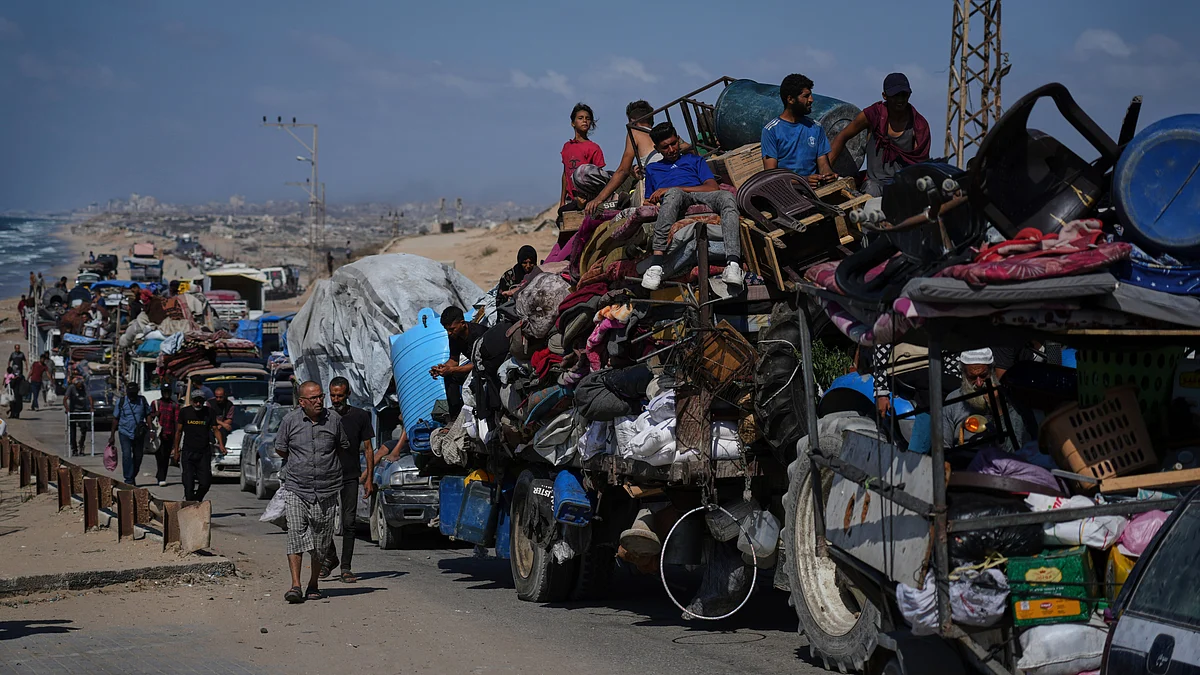Strong words on Gaza from Ursula von der Leyen, but will EU back her sanctions on Israel?
The European Commission president has also called for EU nations to implement partial trade suspensions against Israel over its war on Palestine

European Commission president Ursula von der Leyen declared on 10 September, Wednesday, her intent to propose sanctions and a partial trade suspension against Israel in response to its ongoing military campaign in Gaza — an assault widely condemned as genocidal by human rights organisations.
“Man-made famine can never be a weapon of war. For the sake of the children, for the sake of humanity. This must stop,” she stated — amid applause in the European Parliament in Strasbourg — calling attention to the profound humanitarian crisis inflicted by Israel’s actions.
Von der Leyen’s announcement came amid mounting evidence that Israel’s military offensive in Gaza has systematically targeted civilians with disproportionate force, causing widespread destruction, forced displacement and death on an unprecedented scale.
Reports from Amnesty International and Human Rights Watch have documented deliberate attacks on homes, hospitals and civilian infrastructure — acts amounting to war crimes and genocide — resulting in over 64,000 Palestinian deaths, including a high proportion of women and children.
Associate EU director at Human Rights Watch Claudio Francavilla warned, while expressing approval for von der Leyen’s proposal, that this will go on unless Germany’s premier Friedrich Merz and his Italian counterpart Georgia Meloni — both right-wing actors — “stop blocking EU action”.
He noted that it had anyway taken 2 years of unspeakable crimes, including an Israel-imposed famine, amid growing consensus on the Gaza genocide.
Meanwhile, the Israeli military’s repeated airstrikes have devastated Gaza’s major cities, leaving approximately 90 per cent of the population displaced, subjecting them to starvation and disease through blockades of humanitarian aid, including medical supplies and food.
These tactics have long drawn international denunciation — at least from a large part of the world’s civilian population — as a calculated effort to physically destroy the Palestinian population in Gaza.
On 9 September, Tuesday, just before von der Leyen's speech, Israel launched an airstrike targeting Hamas leaders in Qatar — where negotiations for a ceasefire had been underway. This attack coincided with the Israeli military’s warnings for Gaza City’s mass evacuation ahead of its plan to seize the area known as Hamas’ last stronghold, exacerbating the humanitarian catastrophe faced by hundreds of thousands trapped in conditions of acute famine and bombardment.
Israel’s latest war on Gaza began after Hamas militants abducted 251 people and killed around 1,200, mostly Israeli civilians, on 7 October 2023. Of the 48 hostages believed to be remaining in Gaza, about 20 may still be alive. Hamas has repeatedly offered to exchange the hostages for a full ceasefire and Israeli withdrawal from Palestinian territory — which the Benjamin Netanyahu dispensation has refused, stating that its objective is to decimate Hamas and fully ‘free’ the Gaza Strip of the militant force.
However, while initially the 7 October attack garnered Israel some sympathy and support from most Western/Global North nations over its right to ‘self-defence’, the international community now increasingly condemns the retaliatory Israeli offensive — which has inflicted devastating and clearly disproportionate suffering on Palestinian civilians.
Increasingly, with more of the powers that once backed Netanyahu and the Israeli popular demand for the return of the hostage, turning doubtful — even staunch supporter Germany uttering words of censure — several of the Global North nations are also belatedly out to recognise the state of Palestine. Among the latter are France, Canada, the UK and Australia, in a renewed commitment — at least a verbal one — to the ‘two-state solution’ long mooted as the only way to end the strife in the region.
The European Union, however, remains fractured in its approach, with member states divided over sanctions and trade measures targeting Israel, casting uncertainty over the bloc’s ability to present a unified response despite the European Commission president’s words.
In her speech, von der Leyen also announced the formation of a Palestine donor group next month, with a focus on Gaza’s future reconstruction. This initiative seeks to address the catastrophic consequences of the war and rebuild a shattered society.
In her forceful presentation, von der Leyen also articulated a moral imperative: “For the sake of the children, for the sake of humanity. This must stop.”
This comes amid urgent calls for international accountability to end what many human rights experts describe as a campaign of genocide and systemic war crimes in Gaza — well predating 7 October 2023.
Also Read: Why the war in Gaza doesn’t stop
Follow us on: Facebook, Twitter, Google News, Instagram
Join our official telegram channel (@nationalherald) and stay updated with the latest headlines
